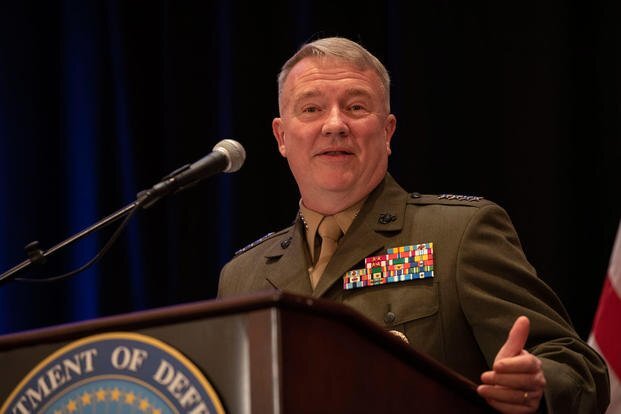U.S. to keep two aircraft carriers to ‘deter Iran’, says Gen. McKenzie

TEHRAN — The top U.S. military commander in the Middle East General Frank McKenzie says the U.S. military plans to keep two aircraft carriers in the Persian Gulf in order to deter Iran from taking retaliatory action for an earlier attack against Iraqi forces.
“We’re going to keep them for a while. And I’m not going to comment on exactly how long that will be, because we typically try to avoid talking about tactical operations,” said McKenzie at a Friday news conference in the U.S. defense department, referring to USS Eisenhower and USS Truman warships.
“In response to this attack on an Iraqi base that hosts coalition forces supporting the Iraqi fight against ISIS, we carried out precision defensive strikes to degrade and destroy advanced conventional weapons that have been provided to Kata’ib Hizbollah by their Iranian backers,” he said.
McKenzie further claimed that the attacks were defensive, saying, “I also want to reiterate that these strikes -- these defensive strikes were designed to destroy Iranian-supplied advanced conventional weapons, and that the United States acted in self-defense in response to a direct and deliberate attack -- a direct and deliberate attack on an Iraqi base that hosts coalition service members.”
Asked whether he was stretching the definition of “defensive”, he admitted that “clearly, dropping a bomb is, in and of itself, an offensive tactical action,” but continued to claim that “in a broader context, these are designed to be defensive strikes.”
The U.S. carried out airstrikes on Thursday and Friday against what it called multiple Iranian-backed militia sites in Iraq, according to the U.S. Defense Department.
The strikes came one day after the U.S. assessed “an Iranian-backed group” was responsible for a rocket attack on a base where coalition forces are located, killing two American service members and one British service member.
The UK government expressed support for the U.S. airstrikes, with the UK’s Defense Secretary Ben Wallace saying “we support the right of the United States to defend themselves, as they have done tonight.”
The U.S. president told reporters on Thursday that he had been working on what to do about the attack which occurred on Wednesday night.
“They’ve sent a lot of rockets now. It hasn’t been fully determined it was Iran,” Trump said.
Afterwards, Iran’s Foreign Ministry summoned the ambassador of Switzerland, whose country represents the United States’ interests in Iran, to protest Trump’s unfounded claim that Iran was behind the attack on U.S. forces in Iraq.
“Following the U.S. president’s unfounded claim that Iran was responsible for the attack against a base of coalition forces in Iraq, the Swiss ambassador to Tehran was summoned to the Foreign Ministry,” Foreign Ministry spokesman Abbas Mousavi said late on Friday.
Mousavi said the Swiss ambassador was also informed that it was, in fact, the wrong policies of the U.S. in Iraq that has led to current tensions and that “American authorities, especially Mr. Trump, cannot shirk their responsibility through such unfounded, baseless and dangerous remarks.”
He also warned the U.S. of the consequences of any reckless action against Iran.
On Saturday, however, a fresh spate of rockets targeted an Iraqi base north of Baghdad where foreign troops are deployed, Iraqi and U.S. security sources told AFP, in a rare daytime attack.
According to Al Jazeera, it was the 23rd such attack since late October on installations across Iraq where U.S. troops and diplomats are based, with the latest rounds growing deadlier.
None of the attacks have ever been claimed but the U.S. has blamed the Hashed al-Shaabi, a network of armed groups incorporated into the Iraqi state.
At least 33 rockets hit Iraqi air defense units at the Taji air base on Saturday, the country's military said, in one of the largest such volleys yet.
MH/PA
